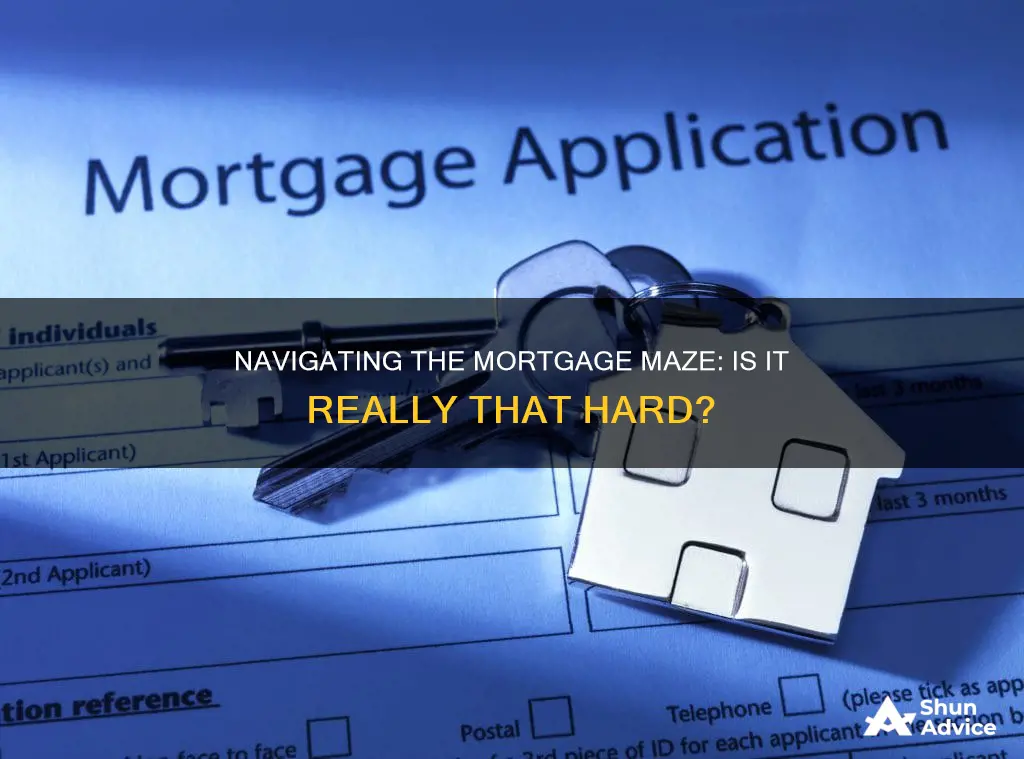
Getting a mortgage can be a challenging process, with lenders scrutinising your finances, credit history, and income. The global financial crisis of 2007 has made banks more cautious, and they now have stringent lending practices. However, it's not impossible, especially if you start preparing early. This includes saving for a down payment, improving your credit score, and understanding your eligibility and loan options. Lenders have different requirements, so it's beneficial to shop around and get pre-approved by multiple lenders to find the best mortgage deal.
How hard is it to get a mortgage?
| Characteristics | Values |
|---|---|
| Difficulty | Very difficult and time-consuming |
| Reasons | Stringent lending practices, extensive paperwork, high credit score requirements, and down payment demands |
| Preparation | Start early, improve credit score, save for down payment and closing costs, understand income and debts, compare lenders and rates |
| Prequalification | Lender's initial assessment of creditworthiness and eligibility, provides an estimate of affordability and monthly payments |
| Preapproval | Full credit report pulled, better understanding of interest rate and loan limits, not a final decision |
| Application | Requires financial information and history, including income, debts, and assets |
| Approval Factors | Credit score, income, debt-to-income ratio, down payment, loan type, lender requirements |
| Denial | Work with lender to address issues, improve credit score, lower debt-to-income ratio, save for larger down payment, consider other lenders |
What You'll Learn

Credit scores and credit history
Your credit score is calculated based on the information in your credit report, with higher scores reflecting a better credit history. The two biggest factors influencing your credit score are whether you pay your bills on time and how much debt you owe. Lenders use your credit score as a quick way to assess if you are likely to pay your future bills, such as your mortgage. Most mortgage lenders use FICO scores and look at scores from all three major credit reporting companies (Equifax, Experian, and TransUnion), using the median score to decide on the rate to offer.
The minimum credit score needed for most mortgages is typically around 620, although this can vary depending on the type of mortgage loan and the lender. Government-backed mortgages, such as Federal Housing Administration (FHA) loans, usually have lower credit requirements than conventional fixed-rate mortgages.
You can improve your credit score by focusing on the underlying factors that affect it, such as making at least the minimum payment on time and managing your debt. It is also important to check your credit report for any errors, as these can reduce your score and lead to a higher interest rate. Additionally, avoid opening multiple new credit accounts in a short period, as this can negatively impact your score.
Before seriously house hunting, it is recommended to get a mortgage preapproval, which will give you a better idea of the interest rate and loan limits you can expect. However, this is not a final decision, as the underwriting process only begins once you have submitted a full application after having an offer accepted on a house.
Assuming a Mortgage: Is It Really a Breeze?
You may want to see also

Down payments
A down payment is the cash you pay upfront when buying a home. The amount of the down payment is decided based on the purchase price of the home and the loan program. The down payment is made at the closing of the deal as part of the cash-to-close payment. The down payment amount is then moved to an escrow account managed by a real estate attorney or settlement officer, who disburses the funds to the seller.
The down payment amount varies depending on the buyer's finances, the type of loan, and the lender. Down payments can range from as low as 3% to 20% or more, and some mortgage programs don't require any down payment at all. The minimum down payment for an FHA loan is 580, but lenders usually want a higher score. A larger down payment reduces the amount borrowed with a mortgage, resulting in lower monthly payments and less interest paid overall. It also means that the buyer will have immediate equity in the home, which can be leveraged later on.
Lenders often view the down payment amount as the buyer's investment in the home. A higher down payment can lead to a lower interest rate, as it represents a higher level of investment. Additionally, a down payment of less than 20% of the home's purchase price typically requires the buyer to pay for private mortgage insurance (PMI), which increases the monthly payments.
When considering a down payment, it is important to think about the lender's requirements and the financial implications of a higher or lower down payment. A larger down payment can make it easier to get approved for a mortgage, but it may be worth considering other options, such as saving for a larger down payment to avoid PMI or exploring programs that offer down payment assistance.
Nationwide Title's Mortgage Note: Recreating the Details
You may want to see also

Mortgage pre-approval
Getting a mortgage can be challenging, especially if you have bad credit or are unable to make a large down payment. However, mortgage pre-approval can be a useful step in the process of buying a home.
To obtain mortgage pre-approval, you will need to provide documentation to your lender, including proof of income (such as recent pay stubs, W-2 forms, or tax returns for self-employed individuals) and asset documentation (such as statements for your checking, savings, and investment accounts). Lenders will also want to see bank statements showing that you have sufficient savings to meet minimum mortgage payments after making a down payment. While the recommended down payment for a traditional mortgage is at least 10%, you will need to put down at least 20% to avoid private mortgage insurance (PMI).
It is important to note that mortgage pre-approval is not a final decision or a commitment from the lender. It is also non-binding, meaning you are not obligated to borrow from the lender that provided the pre-approval. However, it is a useful step that can help you understand your financial capabilities and guide your home search.
Ford's Risky Move: Betting It All to Avoid Crisis
You may want to see also

Paperwork
The mortgage application process can be complicated, especially for first-time home buyers. It involves a lot of paperwork, as the lender will need to assess your financial information and history in great detail.
Lenders will request a range of documents, including:
- W-2 forms and tax returns from the past two years
- Pay stubs from the past 30 days
- Proof of other sources of income
- Recent bank statements
- Details on long-term debts, such as car or student loans
- Identification and Social Security number
- Documentation of sources for recent deposits in your bank accounts
Lenders will also look at your credit score and credit report when determining your eligibility for a mortgage. A higher credit score will increase your chances of approval and may also lead to lower interest rate offers. Most loan types require a minimum credit score of 620, but this may vary depending on the lender and loan type. For example, FHA loans, which are backed by the Federal Housing Authority, have more relaxed credit requirements, with some lenders accepting scores as low as 500.
Additionally, lenders will consider your income, debts, and down payment amount when evaluating your application. It is recommended to have at least a 10% down payment for a traditional mortgage, and a 20% down payment to avoid private mortgage insurance (PMI).
Understanding Mortgage Overtime: Does It Count?
You may want to see also

Lender requirements
Firstly, lenders will want to see that you have a steady income, and they will often require proof of employment. For those who are self-employed, this usually means providing two years' worth of personal and business tax returns, although some lenders may accept just one year. Lenders will also consider your debt-to-income ratio, which they calculate by dividing your total debt by your gross monthly income. A lower debt-to-income ratio is preferable, with conventional lenders typically looking for a maximum ratio of 45%.
Lenders will also assess your credit score and credit history. While there is no minimum credit score requirement, a higher score will generally improve your chances of approval and can also lead to better interest rates. Lenders will also want to see that you have sufficient savings to cover the down payment, closing costs, and other fees, as well as enough reserves to cover several months' worth of mortgage payments in an emergency.
It is worth noting that different lenders have different eligibility requirements, and some are more lenient than others. It is a good idea to get pre-approved for a mortgage, as this will give you a better idea of how much you can borrow and what interest rates you may qualify for. You can then use this information to shop around and compare offers from multiple lenders to ensure you get the best deal.
Mortgage CRM and LOS Integration: A Powerful Combination
You may want to see also
Frequently asked questions
Getting a mortgage can be challenging, especially if you have a low credit score or a thin credit history. Lenders will also look at your income, debt, and ability to make a down payment. However, it's not impossible, and there are steps you can take to improve your chances of approval.
Lenders will typically assess your credit score, income, and overall financial health. They will also consider your ability to make a down payment, which is typically recommended to be at least 10% for a traditional mortgage.
Start by checking your credit score and building your credit history if needed. Reduce any outstanding debt and ensure you have stable employment. Get pre-approved by at least three lenders to understand your options and compare rates. Finally, consider alternative lenders or specialised mortgage products if you have a low credit score or non-traditional employment.







